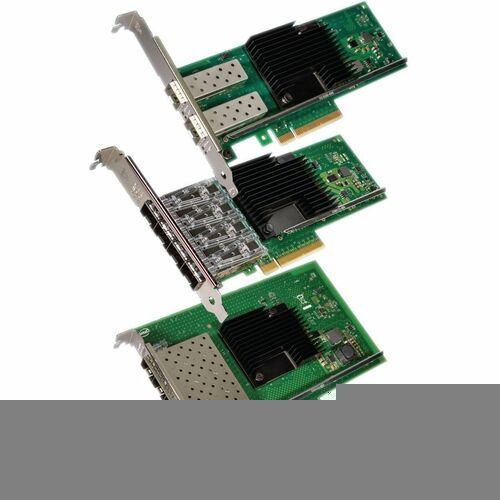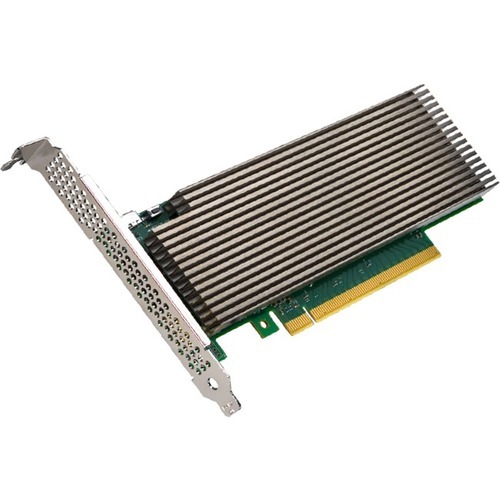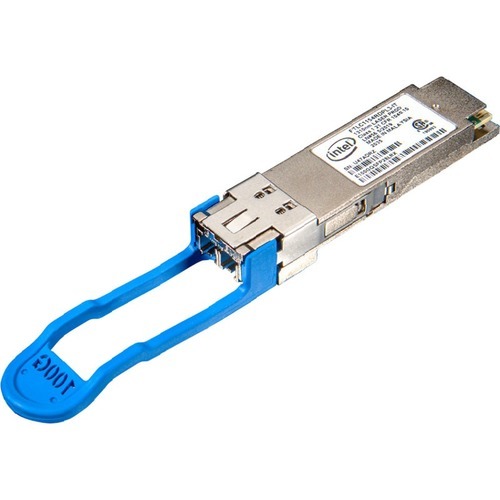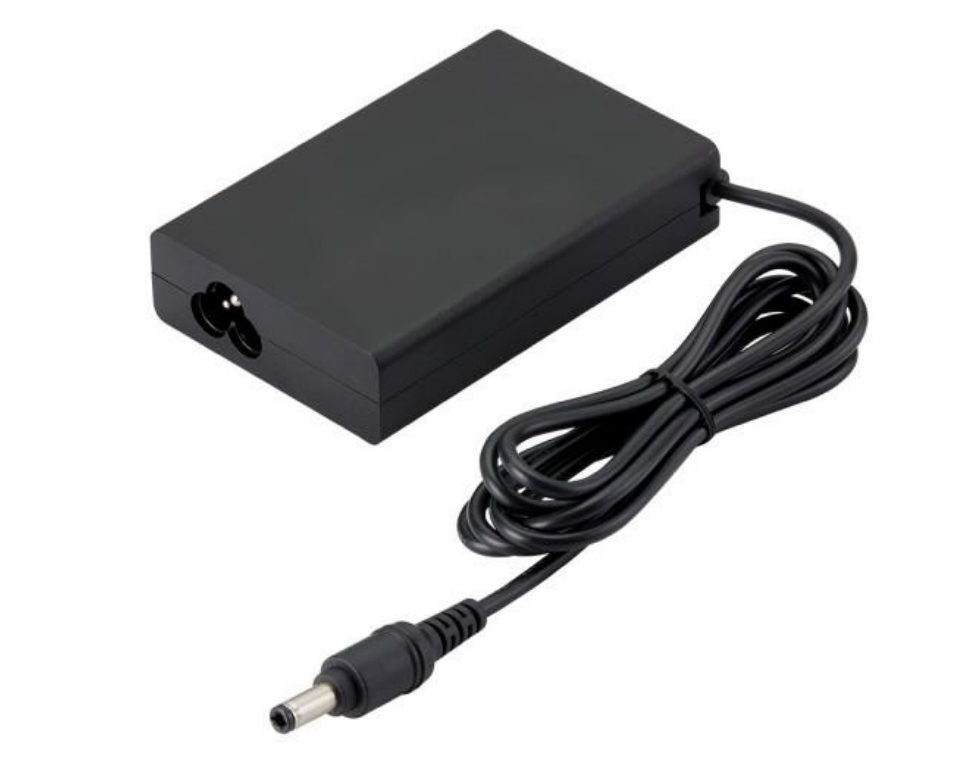Intel EX710DA4G2P5 Intel NC EX710DA4G2P5 Ethernet Converged Network Adapter X710-DA4 Brown Box
the Intel® Ethernet Converged Network Adapter X710 Addresses The Demanding Needs Of An Agile Data Center By Providing Unmatched Features For Both Server And Network Virtualization, Flexibility For Lan And San Networks, And Proven, Reliable Performance.the Intel® Ethernet 700 Series Network Adapters. These Adapters Are The Foundation For Server Connectivity, Providing Broad Interoperability, Critical Performance Optimizations, And Increased Agility For Communications, Cloud, And Enterprise It Network Solutions. Interoperability - Multiple Speeds And Media Types For Broad Compatibility Backed By Extensive Testing And Validation. Optimization - Intelligent Offloads And Accelerators To Unlock Network Performance In Servers With Intel® Xeon® Processors. Agility - Both Kernel And Data Plane Development Kit (dpdk) Drivers For Scalable Packet Processing.intel® Ethernet 700 Series Delivers Networking Performance Across A Wide Range Of Network Port Speeds Through Intelligent Offloads, Sophisticated Packet Processing, And Quality Open Source Drivers.all Intel® Ethernet 700 Series Network Adapters Include These Feature-rich Technologies:flexible And Scalable I/o For Virtualized Infrastructuresintel® Virtualization Technology (intel® Vt), Delivers Outstanding I/o Performance In Virtualized Server Environments.i/o Bottlenecks Are Reduced Through Intelligent Offloads, Enabling Near-native Performance And Vm Scalability. These Offloads Include Virtual Machine Device Queues (vmdq) And Flexible Port Partitioning Using Sr-iov With A Common Virtual Function Driver For Networking Traffic Per Virtual Machine (vm). Host-based Features Supported Include:vmdq For Emulated Path: Vmdq, Enables A Hypervisor To Represent A Single Network Port As Multiple Network Ports That Can Be Assigned To The Individual Vms. Traffic Handling Is Offloaded To The Network Controller, Delivering The Benefits Of Port Partitioning With Little To No Administrative Overhead By The It Staff.sr-iov For Direct Assignment: Adapter-based Isolation And Switching For Various Virtual Station Instances Enables Optimal Cpu Usage In Virtualized Environments. Up To 128 Virtual Functions (vfs), Each Vf Can Support A Unique And Separate Data Path For I/o Related Functions Within The Pci Express Hierarchy. Use Of Sr-iov With A Networking Device, For Example, Allows The Bandwidth Of A Single Port (function) To Be Partitioned Into Smaller Slices That Can Be Allocated To Specific Vms Or Guests, Via A Standard Interface.intel® Ethernet Adaptive Virtual Function (intel® Ethernet Avf): Customers Deploying Mass-scale Vms Or Containers For Their Network Infrastructure Now Have A Common Vf Driver. This Driver Eases Sr-iov Hardware Upgrades Or Changes, Preserves Base-mode Functionality In Hardware And Software, And Supports An Advanced Set Of Features In The Intel® Ethernet 700 Series.enhanced Network Virtualization Overlays (nvo)network Virtualization Has Changed The Way Networking Is Done In The Data Center, Delivering Accelerations Across A Wide Range Of Tunneling Methods.
Intel VACC100G1P5 Intel NT AC VACC100G1P5 vRAN Accelerator ACC100 Adapter Bulk Pack
as Communications Service Providers Move From 4g To 5g Networks, Many Are Adopting Virtualized Radio Access Network (vran) Architectures For Higher Channel Capacity And Easier Deployment Of Edge-based Services And Applications. Vran Solutions Are Ideally Located To Deliver Low-latency Services With The Flexibility To Increase Or Decrease Capacity Based On The Volume Of Real-time Traffic And Demand On The Network. 4g And 5g Forward Error Correction (fec) Acceleration One Of The Most Compute-intensive 4g And 5g Workloads Is Ran Layer 1 (l1) Fec, Which Resolves Data Transmission Errors Over Unreliable Or Noisy Communication Channels. Fec Technology Detects And Corrects A Limited Number Of Errors In 4g Or 5g Data, Eliminating The Need For Retransmission. Since The Fec Acceleration Transaction Does Not Contain Cell State Information, It Can Be Easily Virtualized, Enabling Pooling Benefits And Easy Cell Migration. Increased Vran Cell Density And Efficiency The Intel Vran Accelerator Acc100 Adapter Enables Balanced Platform Performance By Rapidly Performing Layer 1 Fec Algorithms, Making More Host Processing Power Available For Increased Channel Capacity On Edge-based Services And Applications. This Fixed-function Pcie 3.0 Adapter Works With Intel® Xeon® Scalable Processors And Intel® Xeon® D Processors To Enable Low-cost, Power-efficient 4g And 5g Vran Solutions.simplified Integration Ecosystem Readiness And Support For Multiple Deployment Environments Simplifies Integration And Validation Of The Intel® Vran Accelerator Acc100 Adapter: Supports The Flexran Software Reference Architecture To Enable Users To Quickly Evaluate And Build Platforms For The Wide Range Of Vran Networks Uses The O-ran-adopted Dpdk Bbdev Api - An Api That Intel Contributed To The Open Source Community To Enable Choice And Faster Time-to-market For Fec Acceleration Solutions Supports Vm, Bare Metal And Cloud-native Environments
Intel E100GQSFP28LRX Intel ETHERNET OPTIC QSFP28
overview Intel® Ethernet Qsfp28 Optics Are An Excellent Choice For Fiber Systems In High-speed Communications Equipment. Both Short Range And Long-range Transceiver Modules Are Available For Maximum Customer Flexibility. The Extended Case Operating Temperature Allows Customers To Support A Range Of Server Requirements. These 100gbe Optical Transceivers Come Integrated With Four Independent Transmit And Receive Channels, Each Capable Of 25gbe Operation, For An Aggregate Data Rate Of 100gbe. The Qsfp28 Sr4 Transceiver Is A High-performing Module For Sr Optical Links Over Om4 Mmf, And Is Ideal For Short-range, Multi-lane Data Communication, And Interconnects Applications. The Qsfp28 Lr4 Module Is Designed For Extended Reach And Supports Links Up To 10km Of Single Mode Fiber. When Used With Intel® Ethernet Network Adapters With Qsfp28 Connectivity, These Optics Provide Interoperability And Secure Connections For Virtualized Platforms, High-speed Networking, And Consistently Reliable Performance.
Get a Quote
Item(s) added to cart
Netgear GS105E-200NAS ProSafe Plus Switch, 5-Port Gigabit Ethernet - 5 Ports - 2 Layer Supported - Wall Mountable - Lifetime Limited Warranty-None Listed Compliance
MFR: Netgear, Inc
Qty: 1
Part #: GS105NA




